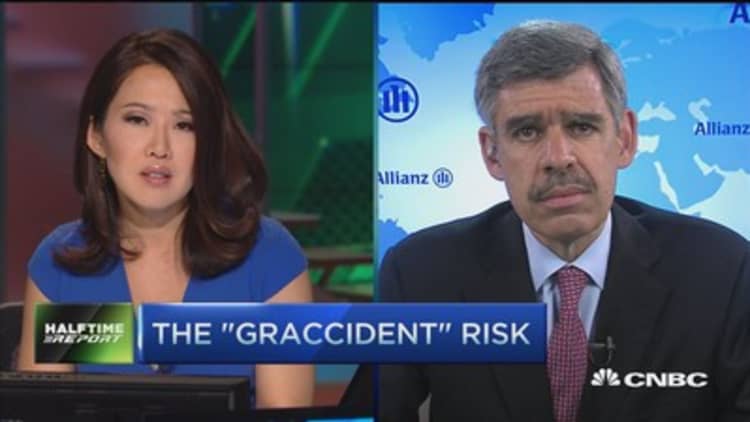Amid political turmoil, recession and a severe cash crunch, the Greek economy has fallen on hard times since the country's debt crisis first broke in 2010.
After six years of recession and record unemployment, Greece faces further pain as it tries to secure more vital funds from its international creditors it needs to pay its bills. Last week, the Greek government managed to withdraw money from a reserve account at the International Monetary Fund (IMF) in order to make a loan repayment - to the IMF.
But in spite of the drama, Greece's economy had started to show some signs of growth: gross domestic product (GDP) is expected to expand by 0.5 percent this year, according to the European Commission, although this is down from earlier forecasts. It follows growth of 0.8 percent in 2014.
These gains are down in no small part to the strong performance in the tourism sector, as well as a rebound in exports.
Here, CNBC takes a look at those industries that are – just about – keeping Greece afloat.
No ‘business paradise’
Tourists have always flocked to Greece – in spite of the country's constant state of crisis. Grecotel is the flagship brand of the N. Daskalantonakis Group, which with around 5,000 employees, is the most significant employer in the Greek hospitality sector.
Mari Daskalantonakis, managing director of the holiday resort hotel management company, told CNBC that while Greece is not a country that could be described as a "business paradise", the firm has seen consistent growth and is in the process of major renovations across a string of its hotels, and a number of new resorts are in the pipeline.

Daskalantonakis, the daughter of the wider group's founder Nikos Daskalantonakis, said financing new projects has been increasingly difficult following the Greek banking crisis, but on the whole European business has been "very supportive".
Read MoreJust how is broke Greece paying its bills
"Obviously it has been difficult, the banking industry sector – the cost of funding is much more expensive now, but in business you are going to experience that sometimes. We support our country, we try to invest as much as we can in whatever way we can, we try to keep the employment and prolong the season and I must say, the European business world is very supportive," Daskalantonakis told CNBC.
"A lot of flights have been added towards Greek destinations and we are very thankful for that too," she said.
The weakened euro has also helped boost demand, Daskalantonakis said, particularly from ex-soviet countries and Russian markets, as the ruble has also weakened dramatically.
Current plans for expansion have had to slow down due to the current economic climate, but she dismissed any fears concerning the current anti-austerity government and the unresolved debt talks with the euro zone.
"We see a little bit of romanticism in this government's approach. Sometimes they don't express themselves, there is confusion. But I think they will adapt – they are patriots, so I think this is the most important thing," she added.
An employment ‘oasis’
Another industry synonymous with the indebted region -- and one where Greece has long had a global reputation -- is shipping. In terms of shipping capacity, the Greek fleet is larger than that of any other nation according to shipping researcher Lloyd's List Intelligence.
However. the industry's success however has little to do with the state of the Greek economy, with less that 1 percent of the cargo carried by Greek ships related to Greek imports or exports.
While shipping offers a kind of "oasis" of well-paid, international class-jobs, Greek shipping faces the same troubles as international industry, Athens correspondent of shipping journal Lloyd's List, Nigel Lowry said.
Read More This may be a greater risk for Greece than default
"By-and-large, the shipping markets since 2008, have not been doing particularly well. Shipping markets tend to be quite volatile – so there have been periods and sectors where there is not necessarily true, but overall it has been a very rough ride," Lowry told CNBC.
But the impact of the shipping industry on the Greek economy cannot be denied, he said, as few industries established in Greece in recent years have been built up without the participation of capital that was initially earned from shipping.
"Symbolically if you drive through Athens, most of the modern assets that exist or are being built now, can be traced in some way (back to shipping) and I suppose the jewels in the crown are the new library and the national opera house," he said.
"A lot of capital from shipping gets reinvested in the Greek economy, whether its real estate, stock markets or other specific industry," he added.
Tighter taxes
In an attempt to bolster its coffers, the Athens government is imposing more stringent taxation measures on the Greek shipping industry. Over the past two years, Greek-owned ships, rather than just ships which bear the Greek flag, have been be taxed. The amount of tax has also doubled, meaning the amount of tax revenues the shipping industry is paying to Greece has grown "exponentially".
The key concern for the future of the Greek shipping industry remaining in Greece is whether the country can maintain a stable environment for business – especially when it comes to taxes. The money that flows through Greece from shipping equates to about 7 or 8 percent of GDP, according to Lloyd's List Intelligence, meaning there is a lot at stake for the economy.
"The percentage of GDP that shipping represents has been going up even during bad markets, where in recent poor shipping markets, its relative importance to the Greek economy has increased," Lowry said, adding that as a cyclical business, shipping market is due and expected to return to relative strength.
"Greece has a number of problems, the main one being government. As watchers and bystanders - they (Greek shipping businesses) want the best of the whole country. The Greek business community and shipping are absolutely desperate for the country to remain in the euro zone, because they believe it is best for the country," he said.





